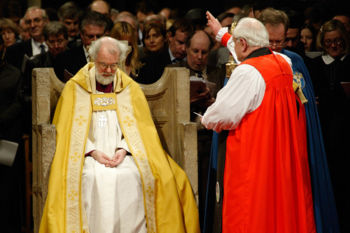Archbishop of Cantebury insists his Sharia law remarks were 'well-researched'
 London, Feb. 10: The Archbishop of Canterbury, Dr. Rowan Williams, last night defended his remarks about some aspects of Sharia law being incorporated in the British legal system, saying that these suggestions were "well researched".
London, Feb. 10: The Archbishop of Canterbury, Dr. Rowan Williams, last night defended his remarks about some aspects of Sharia law being incorporated in the British legal system, saying that these suggestions were "well researched".
Rejecting the charge that he was recommending the introduction of a parallel legal system, Dr. Williams said on Saturday night that the barrage of criticism he was facing was unwarranted.
According to Lambeth Palace (the Archbishop's seat of authority), Dr. Williams has only "sought carefully to explore the limits of a unitary and secular legal system in the presence of an increasingly plural (including religiously plural) society and to see how such a unitary system might be able to accommodate religious claims".
His office said Williams had no intention of resigning, and that his suggestions made at the Royal Courts of Justice and in an interview to the BBC, were evolved after "involved consultation with legal experts, especially people with knowledge and experience of Jewish and Islamic legal systems."
According to The Guardian and several other British dailies, the row is still being seen as the most serious threat to the Archbishop's authority, especially angering conservative elements within the Anglican community, who are already unhappy with his leadership.
According to the Daily Telegraph, at least two synod members have asked him to quit, describing him as a disaster and a man not fit for the job.
However, the Bishop of Southwark, the Right Reverend Tom Butler, has said Dr. Williams is entitled to raise the issue, but argued that it had been done clumsily.
The Telegraph quoted Lord Carey, the former archbishop of Canterbury, as saying: "His (Dr. Williams) acceptance of some Muslim laws within British law would be disastrous for the nation.
He has overstated the case for accommodating Islamic legal codes. His conclusion that Britain will eventually have to concede some place in law for aspects of sharia is a view I cannot share."
The Bishop of Rochester, the Right Reverend Dr. Michael Nazir-Ali, who has both a Christian and a Muslim family background, said all the codes of sharia "would be in tension with the English legal tradition on questions like monogamy, provisions for divorce, the rights of women, custody of children, laws of inheritance and of evidence. This is not to mention the relation of freedom of belief and of expression to provisions for blasphemy and apostasy."
The paper quoted former home secretary David Blunkett said formalising sharia law "would be wrong democratically and philosophically but it would be catastrophic in terms of social cohesion".
Tariq Ramadan, professor of Islamic studies at Oxford University, was quoted as saying: "These kinds of statements just feed the fears of fellow citizens and I really think we, as Muslims, need to ... abide by the common law. And within these latitudes there are possibilities for us to be faithful to Islamic principles."
Baroness Sayeeda Warsi, the Shadow Minister for Community Cohesion, said that setting up rival systems of law would alienate sections of society and may lead to legal apartheid. (ANI with inputs)